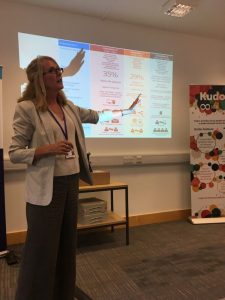We held our second business breakfast on 21st June hosted by Cascaid in Loughborough. This session focused on our Youth Friendly Principle of Recognising Talent.
The full slides are available here:
Download Presentation – Business Breakfast June 2017
Youth Employment UK Business Breakfast – CASCAID – Loughborough University – 21st June

With a mission to help young people and adults make the best decisions about the future career destinations and the learning and training journey they will need to undertake. Sharon explored the Career Big Data Report compiled through their 1.5 million current members. The data available to Cascaid shows a nervous and cautious generation who highlight their skills in caring, listening and having good attention to detail. You can find out more about the data, the work Cascaid do and how Kudos can be used here.
Recognising Talent
With some very good work going on across the UK to encourage more young people to explore careers and investigate different sectors it is imperative that employers are doing all they can to encourage and recognise young talent into their organisation. Recognising talent is very often something that employers think about once staff are in the organisation with many initiatives put in place to recognise and encourage employees. For Youth Employment UK recognising talent is about encouraging and recognising that the recruitment process can put up many barriers for young people looking for work. This principle explores the best practise organisations can put in place in their vacancy and attraction, application and interview processes to enable young people from all backgrounds to access the opportunity.
There are many reasons to encourage more young people into your work place aside from it being ‘the right thing to do’, research shows that non-homogenous workplaces are more profitable. Labour market data shows that youth unemployment remains significantly higher for young people than any other group and our youth members are telling us of the frustration of not being able to find entry level work because of the many requirements for experience put on job specifications.
The principle of recognising talent aims to broaden recruitment practices to ensure that young people from all backgrounds, with all levels of ability can access opportunities. There needs to be the recognition that an entry level job (whether it be school leaver, apprentice or graduate) is a role where young people will need training and support to develop their skills therefore the requirements for the role should reflect this.
At entry level young people’s CVs can often look the same, we need to be more creative in our application processes to allow young people to show their skills and potential.
Recognising Talent – Vacancy and attraction.
As a group there was a discussion around the recruitment practice taking place within organisations: Who is responsible for pulling together the job specifications and requirements? Who is setting the standards and are organisations encouraging enough conversations with recruitment managers about what skills are really needed and offsetting fears with a strong plan in place for entry? Are we requiring all entry level staff to already have strong leadership or decision making skills?
There are a continuing amount of employability skills, soft skills and personality skills listed perhaps without consideration as to whether they are needed. Everyone can be guilty of not double checking a job description isn’t putting unnecessary barriers in place. Employers need to consider: if the role requires numerous qualifications? What skills are really needed now and which can be developed? Is the language of the job specification written in an accessible way?
We encourage organisations to work with young people that have moved into the role or similar roles within an organisation review the job description and job advert too.
Attraction and advertising
Attracting young people and ensuring that you explore all options means being prepared to post the vacancy in a number of places, engaging with schools, colleges and sixth forms, the job centre, talent match, movement to work programmes and great regional programmes can encourage a diverse talent group to apply. It is acknowledged that this can be tricky and more time consuming to ensure you are covering all options but real commitment will reap rewards.
Joanne Godson from Fidler & Pepper, Youth Employment UK’s youth friendly award winner 2016 explained how they had looked at their most recent apprentice recruitment campaign and how one of the barriers was finding the right places to place the vacancy, it has meant making new relationships with schools and colleges and trying many different ways. The interview process was also adapted to reflect that apprentices might not be able to answer the same questions or go through the same process that graduates do – Fidler and Pepper adapted their application process asking questions about the candidate and explaining that they would be the basis of the interview. It was found that the application form often encouraged the applicants to write things down that they might not have been confident enough to say, having the application form as the basis for the interview meant that the interviewer could encourage more conversation around the subject and improved the confidence of applicants.
Matt Hanarahan from Groundwork Nottingham explained the joint project being undertaken with Movement to work. Young people can go on work placements with organisations, both the young person and the employer get the chance to see if the fit is right. The opportunity to trial the role from both the young person and employer perspective is viewed as a positive way to begin that introduction. As well as offering traineeships and open days to give young people who may not have had any experience of the world of work a way of engaging with employers and give some view on what different roles entail and how their skills might sit.
As part of the research prior to the breakfast it was difficult to find good examples of very good job descriptions so as part of the day the attendees were asked to share their best practise tips.
Top tips:
- Try not to rely on old job descriptions or the same processes. Be innovative, sit with the team recruiting and speak to the people doing the role and really work out what the role requires.
- Make it easy to apply – no unnecessarily long application forms and CV’s for entry level roles, consider using video or skills based applications
- Attend job fairs and open days, engage with local events too
- Have your job description on your website with a video by a young person
- Plain English language – no industry speak, acronyms, don’t be to generic (good customer service) What does a day look like
- Consider location – it pays to think that they may rely on public transport – consider what you could do to support that
- Challenge existing processes. If you already have a young cohort – get them to give feedback and make changes
- Make sure all content is an easy format to read, is it accessible on mobile?
- Try and sell the job – make it more appealing – young people are also interested in social responsibility – what fundraising and volunteering opportunities are there
- Be prepared to drop some of the educational requirements if they are not required
- Look at enthusiasm, attitude and willingness rather than academic
- Make expectations clear
- Use multiple sites
- Set expectations internally with recruitment manager and human resources teams, making the commitment to train and work with entry level staff can encourage more open minded views internally.
Application Process
Laura-Jane Rawlings led a discussion on fully reviewing the application process. Organisations should reconsider asking for long application forms, CVs and cover letters for very entry level roles requiring little experience. Not all young people have had a careers advisor or have access to guidance who will help to draw out skills and practice writing CVs and cover letters, consider other ways of assessing abilities.
Test the process: can the application be accessed via tablet and/or mobile phones? Has the online application been tested? The first part of the engagement needs to be engaging otherwise people can become easily disengaged. Don’t be scared to set fair benchmarks for the application but add guidance notes on completing any application forms. Engage with previous successful candidates, encourage existing employees to be honest about the process they faced and if it reflects what is really necessary to join the organisation
Understanding new GCSE grading criteria: think about the sometimes traditional ask of 5 A-C grades as the system changes at present universities are not agreeing what the number system relates – keep track of updates and changes and what this really means to the skills you may or may not require.
Advice and guidance has changed within the curriculum with young people not always having access to help and support needed to make career decisions or to know how to compile a CV or behave in interviews. If a young person is given little support and has little access to experience will lengthy application, CV and cover letter process encourage their application?
Provide information as to what might be discussed in the interview, perhaps give practice questions and a really clear idea of what you are looking for. If the interview will be competency based, share the competencies that are being tested against and some trusted information on how competency based interviews are run.
Consider the shortlisting criteria, is it reasonable? Ask young people in your networks if the criteria is ok. Talk to rising stars within your organisation and consider if any of your criteria would have stopped them from entering the organisation.
A common criticism from young people is that when they apply for jobs they get no feedback, when they don’t get feedback they will continue to keep doing the same things, if no one explains that their CV or cover letter is unacceptable or needs proof reading they will continue to undertake the same actions and potentially disengage with the process.
Interview and Selection Process

Employers are recruiting more entry level staff particularly apprentices but have not adapted the interview process. Doing things, the way you have always done them will not always work, using the same process for apprentices that might have been set up for graduates will not guarantee a truly accessible process.
Consider who is in the room. Is there a trained person in the room who has been involved with supporting and encouraging young people?
We encourage that organisations give feedback to those who have attended an interview but not been offered the role. Whilst it might challenging to give feedback at every stage of application it is a fair expectation that after an interview feedback is given.












